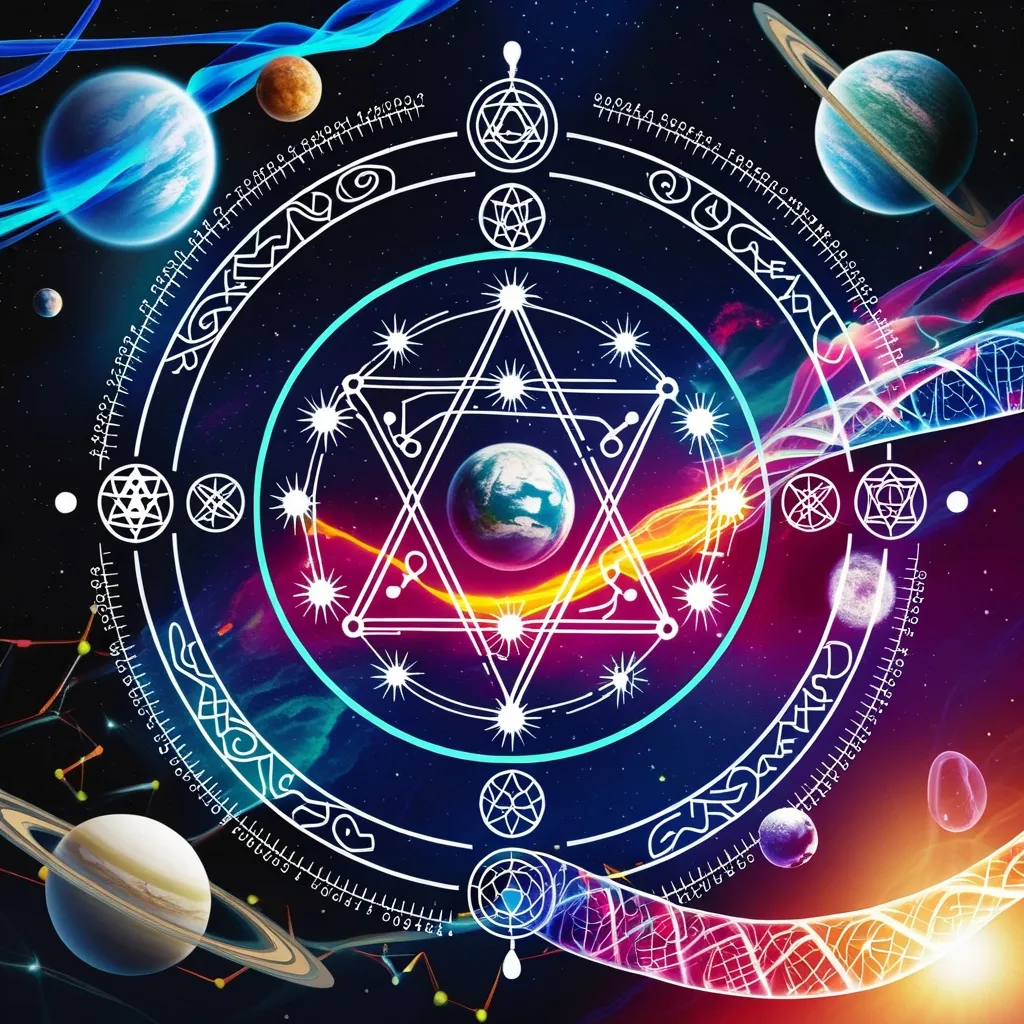Hinduism: Ancient Wisdom Meets Modern Science
Ever wondered if those age-old Hindu practices your grandma swears by actually have any scientific backing? Well, buckle up, because we’re about to dive into a world where ancient wisdom and modern science collide in the most fascinating ways.
Hinduism, often seen as a jumble of colorful rituals and mystical beliefs, has been quietly harboring some mind-blowing scientific concepts for thousands of years. It’s like finding out your quirky old aunt was a secret genius all along!
Let’s start with something we use every day without even thinking about it - zero. Yep, that little round number that makes our decimal system possible came straight out of ancient India. Hindu scholars were playing around with the concept of nothingness while the rest of the world was still struggling to count their sheep. Talk about being ahead of the curve!
But wait, there’s more! Remember learning about Copernicus and how he shocked everyone by saying the Sun was at the center of our solar system? Well, guess what? Ancient Hindu texts like the Rig Veda and Upanishads were dropping that knowledge bomb centuries before Copernicus was even a twinkle in his parents’ eyes. It’s like they had a cosmic inside scoop or something.
Now, let’s talk about health. Ayurveda, the ancient Indian system of medicine, isn’t just about weird-smelling oils and tongue scraping (although those are pretty cool too). It’s a holistic approach to health that modern science is only now starting to catch up with. Fasting, for instance, isn’t just a way to make yourself hangry. It actually gives your digestive system a much-needed break and helps flush out toxins. So next time you skip breakfast, just tell everyone you’re doing an ancient Hindu detox.
Speaking of health, ever wonder why your grandma insists on using copper vessels? It’s not just because they look pretty. Ancient Hindus were onto something when they tossed copper coins into rivers. Turns out, copper is essential for our health, and this practice ensured people got their daily dose of this vital metal. It’s like they were creating a primitive multivitamin drink!
Let’s move on to something we all struggle with - getting out of bed in the morning. The ancient Hindu practice of Surya Namaskar, or Sun Salutation, isn’t just a fancy yoga routine. It’s a scientifically backed way to kickstart your day. Doing this routine early in the morning helps maintain both physical and mental health. Plus, looking at the sun’s rays through water or directly (don’t stare too long, though!) is great for your eyes. It’s like nature’s own Instagram filter for your peepers.
Now, let’s address the elephant in the room - or should I say, the idol in the temple. Idol worship in Hinduism isn’t just about appeasing some higher power. It’s actually a clever psychological trick to help people concentrate during prayers. Visualizing an object helps shape thoughts and maintain focus. It’s like ancient Hindus invented their own version of mindfulness meditation!
Speaking of temples, they’re not just architectural marvels. They’re scientifically designed energy centers. The main idol is placed at the core center, where the earth’s magnetic waves are strongest. Copper plates with Vedic scripts are buried beneath, absorbing and radiating these magnetic waves. Walking clockwise around the idol helps you soak up this positive energy. It’s like a natural recharging station for your body and mind!
Let’s talk about fasting again, because who doesn’t love an excuse to skip meals? According to Ayurveda, fasting isn’t just good for your digestive system. It also helps balance your emotions. Apparently, the moon’s gravitational pull affects our body’s fluids, leading to emotional imbalances. Fasting during certain lunar phases helps maintain emotional equilibrium. So next time you’re feeling moody, blame it on the moon and grab a salad.
Now, here’s a fun fact for all you plant lovers out there. The Tulsi plant, sacred in Hinduism, isn’t just for religious purposes. It’s nature’s own insect repellent! Keeping a Tulsi plant at home naturally keeps bugs and mosquitoes away. It’s like having a tiny, leafy bouncer for your house.
Ever wondered why some people worship the Peepal tree? It’s not just because it looks cool. This tree is an oxygen-producing machine, pumping out O2 even at night. Ancient Hindus knew the importance of trees long before we started worrying about carbon footprints.
Here’s a simple one - joining your palms together in greeting. This isn’t just a polite gesture. It actually helps balance the left and right sides of your brain and reduces stress. It’s like a mini yoga session every time you say hello!
Let’s get a bit geeky now. Ancient Hindu mathematicians were working on binary numbers and complex algorithms while the rest of the world was still figuring out basic arithmetic. They basically laid the groundwork for modern computer science. So next time you’re binge-watching your favorite show, thank an ancient Hindu mathematician!
Speaking of thanking people, we should probably give a shout-out to ancient Indian medical practitioners. They were performing complex plastic surgeries and skin grafts long before it became a Hollywood trend. The Sushruta Samhita, an ancient medical text, reads like a modern surgical manual. These guys were the original Dr. 90210s!
Finally, let’s talk about something cool - literally. Ancient Indians were masters of metallurgy, producing a high-carbon steel called Wootz that was the envy of the world. This super-strong, super-sharp steel was lost to time but has recently been rediscovered by modern scientists. It’s like finding a long-lost family recipe, but for sword-making.
So there you have it - Hinduism isn’t just about colorful festivals and epic stories. It’s a treasure trove of scientific knowledge that was way ahead of its time. From mathematics to medicine, from astronomy to psychology, ancient Hindu practices and teachings have laid the groundwork for many modern scientific discoveries.
Next time someone tells you that religion and science don’t mix, just smile and tell them about the time ancient Hindus invented zero, mapped the solar system, pioneered plastic surgery, and created super-steel - all while teaching people to greet each other in a way that balances their brains. Now that’s what I call a truly holistic approach to life!
Remember, Hinduism isn’t about blindly following traditions. It’s about understanding the deep scientific insights hidden within these ancient practices. So go ahead, embrace your inner scientist-sage. Who knows? You might just discover the next big scientific breakthrough hidden in an ancient Sanskrit text!






